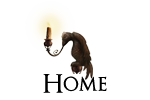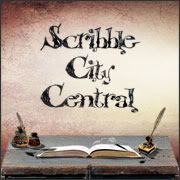The very first Mythic Interview Friday is here! I am so excited that Caroline Lawrence, author of The Roman Mysteries has agreed to be first up to answer my seven searching questions on the important subject of myth. I've been reading Caroline's books since The Thieves of Ostia was published back at the beginning of the century, and have followed her detective-heroine Flavia Gemina's adventures with ever-increasing pleasure (and awe at Caroline's murderous inventiveness). Her latest, The Legionary from Londinium and Other Mini Mysteries has just been published, and I devoured it at a sitting. It's been lovely for me to find someone else who is as obsessed with life in the Classical World as I am. Caroline is much better at Latin than me--but I shall risk getting it wrong and say: "Gratias tibi ago, Carolina."
1. Do you think that the retelling of Greek and other myths is important or relevant for the children of today? Why should they care about some “dry old stories” which come from ancient cultures they might never even have heard of?
Absolutely myths are important. They are the stories we crave most, especially that of the quest or ‘Hero’s Journey’. This is because our whole lives are a kind of journey and we go on many quests every day. I believe mythic story structure is inbuilt and that it is part of what makes us human. That is why myths are so similar across so many cultures and time periods. Also, the mythic journey makes up maybe 80% of the stories we tell even today.
2. What age were you when you came across your first myth or myths? Were you a child—or were you already an adult? Tell us how you felt then about the myths you first discovered. Did you love them or hate them? Did they scare you, excite you—or were you indifferent? What kind of myths were they? Greek? Norse? Native American? Celtic? Or from another culture entirely? Were they in a book you read? Or did you hear them as oral storytelling from someone else?
I was about six or seven when I was first introduced to the Greek myths. My mother used to read to me and my brother and sister every night. In among other children’s classics like The Cat in the Hat and Curious George, she read us the Greek myths. We also had one beautiful illustrated volume of Greek Myths in the house that I used to pore over. My mother was an artist and also had lots of art books with sculptures, paintings and frescoes of scenes from the Greek Myths. Though I am Californian I rarely heard Native American folklore and although I’m half Jewish, it was only as an adult that I came across the wonderful midrashic stories surrounding the Old Testament.
3. Looking back, what is your favourite myth of all time, from any culture? And why would you choose it?
I love any quest but my favourite is probably the story of Perseus, because he got all the magical tools to help him, like winged sandals and a helmet of invisibility.
4. Who is your most hated mythical hero or heroine, and what made you feel that way about them?
I hated Helen of Troy, because she seemed imperious in her beauty, and caused the deaths of so many people. While heroes were dying, she was dallying with Paris on silken cushions!
5. Is there a mythical beast you are particularly fond of? If so, which one?
I was never as captivated by the beasts as I was by the people, but I have utilized mythical beasts in my books, even though they are historical fiction and not fantasy. Pegasus is a theme in The Charioteer from Delphi and the Hydra also haunts Nubia’s dreams in that book.
6. How have myths had an influence on your writing, if at all?
Myths have had an enormous influence on my writing. I am a great devotee of Hollywood story structure techniques, and one of my favourites is The Hero’s Journey as described by Christopher Vogler (and others) and based on Joseph Campbell’s book The Hero with a Thousand Faces. Almost every one of my 17 Roman Mysteries incorporates at least one Greek Myth. The first book is based around the myth of Cerberus, the second around Vulcan, the third around the myth of Dionysus and the Pirates, etc, etc. One of the most obvious is the myth of Hercules in The Twelve Tasks of Flavia Gemina, the sixth book in my series.
7. Finally, If you could choose to be the demigod child of any one mythical god or goddess, which one would it be? Which power would you like to inherit from them—and what would you do with it?
I would love the winged sandals of Mercury/Hermes, so that I could fly!
More about Caroline:
Caroline Lawrence is a Californian who was inspired to study Greek and Latin at the age of 19, after reading Mary Renault’s Last of the Wine and The Iliad in translation. She won a scholarship to Cambridge, taught Latin for ten years, and now writes the Roman Mysteries books for children aged 8 up. She says her happiest publishing moments were when she passed the million sales mark, when she got to visit the Tunisia and Bulgarian sets of the BBC TV series based on her books, and when she won the Classical Association Prize for ‘a significant contribution to the public understanding of Classics’.
Her website is HERE and her main blog is HERE. She ‘tweets’ under the name @CarolineLawrenc (without the final ‘e’).
Friday, 2 April 2010
Mythic Interview Friday: Number 1 - Caroline Lawrence
Subscribe to:
Post Comments (Atom)

















13 comments:
I never answered the question about which god or goddess I would like to be a parent. I think it would have to be Athena, because of her wisdom. Too bad she's a virgin and never had kids! ;-)
If you want her, you can have her, Caroline! After all, Rick Riordan took liberties with her virginal status and gave her kids for the Percy Jackson books.
Oh look Lucy! Someone's made my Mercury shoe! http://eternallycool.net/2010/03/shoes-for-ms-mercury
Right. Well after a start like that, it will be SO easy to follow Caroline...
Caroline--I WANT THOSE SHOES! If only I could wear high heels....
Bookwitch--stop being so modest--you will be brilliant as always.
So enjoyed this post, Lucy and Caroline! And really looking forward to more Mythic Fridays.
PS, my car is called Artemis... ;-)
Fab interview, Lucy, we're big fans of Roman Mysteries in our house :)
Yes! Fab interview, am worried about the winged shoes though - always thought they'd just tip you over. In entirely the wrong place for wings.....
Glad you both enjoyed it, Nicky and Tamsyn. Nicky--I am sure that Artemis is a speedy hunter of the swiftest road to anywhere!
Great interview. I'm dying to check out Caroline's books now. My mum is a classicist so we grew up with the myths, and I've recently picked up a copy of Lucy's Atticus the storyteller book and can't wait to add it to our bedtime reading routine.
Artemis is my favorite and I love a lot of the lesser ocean nymphs.
I too hated Helen of Troy because she seemed so oblivious of the death and pain she caused. It would be nice to re-write that and give her some backbone.
Great interview, many thanks to both of you!
Fabulous interview! I am so looking forward to these Fridays now. And if Athene has been de-virginised already, I'll have her for a mother too :-)
Delighted by all these positive comments--thanks so much, we've had a great response on Twitter and FB too--delighted to see you here, Leonie, by the way.
Kathryn--they are Magic Wings, so normal rules of gravity do not apply to these shoes!
Jo--I wonder what others will say about Helen of Troy--lots of people seem to blame her for all that death and destruction, and I sort of agree. However, one doesn't argue with Aphrodite's amorous machinations--one isn't able to! So perhaps it wasn't something she could do anything about and we should be giving her the benefit of the doubt. Very interesting take on how her disenchantment set in with Paris in Adele Geras's Troy, which I have just re-read and loved all over again.
Gillian--you may certainly have Athene for a mother. But don't give too much away...!
Post a Comment